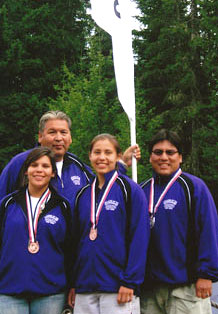|
quot;>Above are all members of Team New York: from left are Chelsea Redeye, Cochese Redeye, and Katy Bacco, with Lt. Wheeler. |
Three teammates from the Cattaraugus territory of the Seneca Nation also won medals in rifle shooting. Taking home bronze medals for aggregate scores in their categories were Chelsea Redeye (midgets), Cochese Redeye (seniors) and Katy Bacco (juveniles).
Wheeler competed in all three rifle shooting events held Aug. 6 and 8. Contestants were required to take 60 shots at 50 meters from three positions: prone, standing, and kneeling. He won the gold medal in the prone position, and silver medals in both the standing and kneeling. For achieving the second-highest aggregate score for shooting from all three positions among those aged 20 and older, Wheeler won his third silver medal.
Wheeler, 46, has been shooting competitively for 15 years. He also competed at the 2006 North American Indigenous Games, held in Denver, CO, where he place fourth overall in his category. Enrolled in the Walker River Paiute tribe of Schurz, Nevada, he said, “The games are a great way to meet and network with fellow Native Americans.”
Staged intermittently since 1990, the indigenous games are managed by the Native American Sports Council, Inc., a non-profit arm of the United States Olympic Committee. Unlike the world Olympic Games, they place an emphasis on the cultures, traditions and spirituality of indigenous people.
The Cowichan Tribes of Vancouver Island, B.C., hosted the 2008 games, staging numerous cultural events, including an opening “parade of nations” composed of athletes, aboriginal veterans, cultural performers and others. Some 10,000 participants paraded through downtown Duncan, B.C., to the opening ceremonies grounds, formally Cowichan Territory.
The games showcased athletes in 3-D archery, badminton, baseball, basketball, boxing, canoeing, golf, lacrosse, soccer, softball, swimming, taekwondo, volleyball and wrestling.




